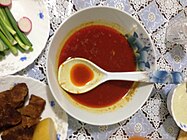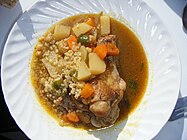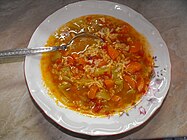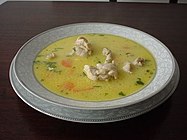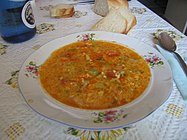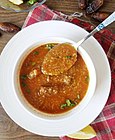Chorba (/ˈtʃɔːrbə/ CHOR-bə; Turkish: [tʃɔɾˈba])[a] or shorba (/ˈʃɔːrbə/ SHOR-bə; Azerbaijani: [ʃoɾˈbɑ])[b] is a broad class of stews or rich soups found in national cuisines across the Middle East , Algeria, Maghreb, Iran, Turkey, Southeast Europe, Central Asia, East Africa and South Asia. It is often prepared with added ingredients but is also served alone[1] as a broth or with bread.[2]
Etymology
The word chorba in English and in many Balkan languages is a loan from the Ottoman Turkish چوربا çorba, which itself is a loan from Persian شوربا šōrbā. The spelling shorba could be a direct loan into English from Persian or through a Central or South Asian intermediary.
The word is ultimately a compound of شور šōr meaning 'salty, brackish' and با bā meaning 'stew, gruel, spoon-meat'.[3] The former is from Parthian 𐫢𐫇𐫡 šōr meaning 'salty', and the latter from Middle Persian *-bāg meaning 'gruel, spoon-meat'.
The etymology can be definitively tied to Persian through the cognate شورباج šōrabāj; in modern Persian, while شوربا šōrbā evolved to mean 'broth, stew', شورباج šōrabāj simply means 'soup'.[4] It is typical for Middle Persian word-final 𐭪 g to either change to ج j or to be dropped altogether in Modern Persian.
The dialectal Arabic word شوربة šūrba or شربة šurba is also a loan from Persian and cannot be etymologically tied to شرب šariba meaning 'to drink'. That said, it is highly likely that phono-semantic matching occurred during the loaning of the word into Arabic, which would explain the orthographical difference.
Chorba is also called shorba (Amharic: ሾርባ), sho'rva (Uzbek: шўрва), shorwa (Pashto: شوروا), chorba (Bulgarian: чорба), čorba (Serbo-Croatian Cyrillic: чорба), shurbad (Somali), ciorbă (Romanian), shurpa (Russian: шурпа), shorpa (Uyghur: شورپا / шорпа), çorba (Turkish), shorpo (Kyrgyz: шорпо) and sorpa (Kazakh: сорпа).[citation needed] In the Indian subcontinent, the term shorbā in Urdu-Hindi (شوربہ / शोरबा) simply means gravy. It is a Mughlai dish and it has vegetarian forms such as tomato shorba.
Types
Shorwa is a traditional Afghan dish which is a simple dish which is usually mixed with bread on the dastarkhān.[5] It is a long process and a pressure-cooker is usually used, as it reduces the process to 2 hours. The main ingredients for shorwa are potatoes, beans and meat.[6] It is commonly served with Afghan bread.[7]
Ciorbă, as called in Moldova and Romania, consists of various vegetables, meat and herbs. Borș is a sour soup that is used in the Moldova region.[8] There are several types of this dish, such as ciorbă de perișoare, leek soup, Romanian borscht, and borș de burechiușe.
Gallery
-
Traditional Afghan shorwa
-
Algerian chorba
-
Bosnian begova čorba and somun bread
-
Bulgarian Kurban chorba
-
Kyrgyz shorpo
-
Serbian chicken čorba
-
Romanian ciorbă
-
Algerian chorba frik
See also
Notes
- ^ From Ottoman Turkish چوربا çorba.
- ^ From Persian شوربا shōrbā [ʃoːɾˈbɑː], Iranian Persian: shurbā [ʃuːɹˈbɒː]
References
- ^ "What is Shorba and why is it good for you in winter". Entertainment Times. India. 2019-12-27. Retrieved 2021-05-25.
- ^ Roden, Claudia (1974). A Book of Middle Eastern Food. United States: Random House, Inc., New York. p. 109. ISBN 0394-71948-4.
- ^ "A Comprehensive Persian-English Dictionary, Including the Arabic Words and Phrases to be Met with in Persian Literature". dsal.uchicago.ed. January 23, 2023. Retrieved 2023-01-23.
- ^ "A Comprehensive Persian-English Dictionary, Including the Arabic Words and Phrases to be Met with in Persian Literature". dsal.uchicago.ed. January 23, 2023. Retrieved 2023-01-23.
- ^ Bradnock, Robert W. (1994). South Asian Handbook. Trade & Travel Publications. ISBN 9780844299808.
- ^ "Shorwa-E-Tarkari (Meat & Veg Soup)". KitchenRecipes.
- ^ "Shorwa-E-Tarkari (Meat & Veg Soup) | Afghan Kitchen Recipes".
- ^ "Teorii de istorie culinară care ne dezamăgesc: borşul şi mujdeiul, singurele alimente cu adevărat româneşti. Micii inventaţi de Cocoşatu' – un mit urban". adevarul.ro. July 30, 2015. Retrieved 2020-03-17.









